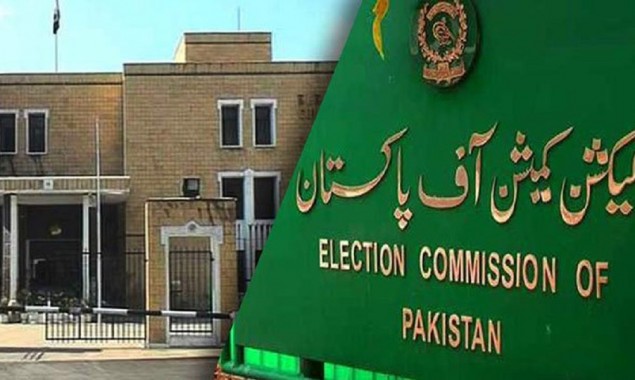SECP rationalises advertisement requirements for equity funds
ISLAMABAD: The Securities and Exchange Commission of Pakistan (SECP) has specified certain...

Image: File
The Election Commission of Pakistan (ECP) has formally expressed its reservations about the Elections Act (Amendment) Bill to the government via letters as the controversy over the government’s proposed poll reforms continues.
These amendments were also rejected by the opposition parties, who branded it “bulldozed legislation.” They were passed in the National Assembly, where the PTI-led coalition has a majority, but it will be difficult to pass them in the Senate due to the opposition’s strength.
The Election Commission has objected to 45 of the 72 proposed amendments, as detailed in two separate letters sent to the Ministries of Parliamentary Affairs and Law and Justice.
During a press conference a day earlier, Adviser on Parliamentary Affairs Babar Awan expressed his regret that the Election Commission had not first spoken to the government about its “objections” to the amendments before publishing a press release.
According to ECP sources, the government was given a document with reasons for opposition, which listed 15 amendments that were contrary to the Constitution and five that were contradictory with the Act itself, as well as 17 amendments that were objected to on administrative grounds. On the other hand, the Election Commission has backed 27 amendments as-is and another eight with changes.
[amazonad]
According to the document, the change in sections 17 and 221 requesting “delimitation on the basis of voters rather than population” was approved. The Election Commission further pointed out that the change is in violation of Article 51(5), which mandates population-based seat allocation, which implies population-based delimitation. Similarly, the proposed omission of 11 sections of Chapter-IV (sections 24, 26, 28, 29, 30, 31, 32, 33, 34, 36, and 44) relating to preparation and revision of electoral rolls has also been objected to finding this in conflict with Articles 219(a) and 222(c) of Constitution.
It claims that Article 219(a) requires annual revisions of electoral rolls and that Article 222 assures that no law can take away or limit the commissioner’s or the Election Commission’s powers.
The Election Commission emphasizes that the deletion of the aforementioned parts will effectively strip the commission of its power to prepare and revise electoral rolls and pass them over to Nadra, which would be in violation of Article 222.
Furthermore, a proposed modification to Section 25, which would allow Nadra to register a new CNIC holder as a voter, has been contested on the grounds that voter registration is an exclusive competence of the ECP under Article 219 of the Constitution.
On the same grounds, the commission is concerned about the proposed revision to Section 43, which would allow Nadra to remove the name of a deceased voter from the electoral rolls.
Similarly, a change to Section 104(4) and (5) allowing parties to submit a new list in the case of a vacancy has been determined to be unconstitutional, as Article 224(6) of the Constitution only allows for additional names once the preceding party-list has been exhausted.
The commission has objected to a proposed modification to Section 231 that would include an explanation for using the scrutiny date as the critical or cut-off date for determining eligibility or disqualifications, claiming that it would be in violation of Articles 62 and 63 of the Constitution. Which provides for a candidate’s pre-qualification and a lawmaker’s post-disqualification: Constitutional provisions cannot be regulated by a statute.
Another proposal in Section 9 that would reduce the time it takes for ECP to declare a poll void from 60 to 30 days was also defeated. According to the commission, a shorter time of 30 days will make holding an inquiry almost difficult. Similarly, a change to Section 273 that would impose a three-year prison sentence for the guilty official has been rejected on the grounds that Section 188 of the Elections Act 2017 already imposes a two-and-a-half-year sentence for an offense under Section 172. (2) As a result, the panel claims that two fines for the same offense are incompatible with Article 13 of the Constitution.
A change to Section 17 requiring the commission to finish constituency delimitation at least four months before the issue of the election schedule has been challenged on the grounds that unforeseen circumstances may arise, as they did in the 2018 general election.
According to the letter sent to the Parliamentary Affairs Ministry, the ECP has requested that Prime Minister Imran Khan be informed of the electoral body’s reservations before the bill is tabled in the Senate.
According to government sources, the letter dated June 17 was leaked to the media before it was delivered to them, and its contents were also published two days ago. According to the ECP, the proposed law includes an amendment that calls for voting by open ballot, which is in violation of Article 226 of Pakistan’s Constitution.
The ECP has already stated its position in this regard during a presidential reference on the open ballot before the Supreme Court, according to the letter, which also stated that the ECP’s power may be limited if the law is implemented.
“The matter should be raised with Prime Minister Imran Khan before tabling the electoral reforms bill in the Senate,” it said.
Catch all the Business News, Breaking News Event and Latest News Updates on The BOL News
Download The BOL News App to get the Daily News Update & Follow us on Google News.